ICHIRO SUZUKI
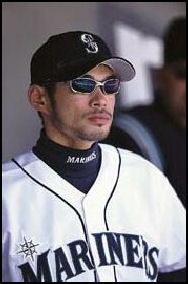
Ichiro Suzuki has arguably had more of an impact on the U.S. Major League than any other Japanese player. In his first year with the Seattle Mariners in 2001 he was voted the Most Valuable Player and Rookie of the Year in the American League. As of 2008 he won eight gold gloves, had 200 hits and made All-Star appearances in all eight of his Major League seasons, some years receiving more votes from fans than any other player in the All Star balloting.
The New York Times called him “an artist who makes the field his canvas.” The Los Angeles Times compared Ichiro with Rod Carew and Wade Boggs in their prime. The Chicago Times reported, "In Japan, he's both Michael Jordan and Michael Jackson." One survey found that he was more recognizable in Japan than the Emperor. A Los Angeles Times sports reporter wrote, he was "faster than a speeding bullet and able to leap tall outfield fences in a single bound." Mariner's teammates called him the Wizard and Itchy balls.
Ichiro is very small by Major League standards. He is only 5'9 and weighs 160 pounds. Many considered him to small and skinny to make it the Major Leagues. When he joined the Japan league he weighed only around 140 pounds. He has put on some muscle after joining the Major Leagues. In 2011, at the age of 37, Ichiro still only had 6 percent body fat and, according to the Mariners’ trainer, the muscle tone of a man in his 20s.
In 2010, Ichiro was selected as the most popular athlete in Japan in a Yomiuri Shimbun poll for the sixth consecutive year. Ichiro led the majors in hits seven times in his ten-year career as of 2010 and did it five years in row from 2006 to 2010. In 2010, Ichiro played in his 10th All-Star game, finishing second in voting among American league outfielders. He was the only Japanese player selected in 2010.
Ichiro won his 10th consecutive gold glove in 2010, tying the AL record for Gold Gloves for an outfielder with Ken Griffey Jr. and Al Kaline. In 2010, Ichiro had four errors in 162 games and a .989 fielding percentage. Ichiro was the first to win ten straight in his first 10 Major League seasons. The overall record for outfielders is held by Willlie Mays and Roberto Clemente with 12 each. The award was only started in 1957 and others no doubt would have reached similar numbers had they had the award earlier.
Good Websites and Sources: Baseball Reference baseball-reference.com ; Major League Baseball mlb.mlb.com/team/player ; Wikipedia article Wikipedia ; Collecting Ichiro Card Collecting Site collectingichiro.com ; Google e-book books.google.com/books ; Pictures zimbio.com ; Club Ichi Fan Site clubichiro.com ; Ichiro Fan Club myspace.com/ichiro51sea ;Time Magazine Asian Hero time.com/time/asia ;
Links in this Website: SPORTS IN JAPAN (Click Sports, Recreation, Pets ) Factsanddetails.com/Japan ; JAPANESE BASEBALL Factsanddetails.com/Japan ; JAPANESE BASEBALL RULES, CUSTOMS AND FANS Factsanddetails.com/Japan ; JAPANESE BASEBALL TEAMS Factsanddetails.com/Japan ; JAPANESE BASEBALL PLAYERS Factsanddetails.com/Japan ; JAPANESE MAJOR LEAGUE PLAYERS Factsanddetails.com/Japan ; JAPANESE MAJOR LEAGUE PITCHERS Factsanddetails.com/Japan
Ichiro’s Life
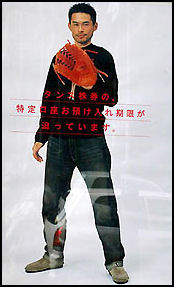
ad poster Ichiro was born in 1973 in Aichi Prefecture, near Nagoya. Suzuki is the most common family name in Japan. Ichiro is also very popular. It means "firstborn." his father gave him that name even though he was actually the second born in his family. His father was a high school player . He was intent on his son became a star baseball player and massaged his feet every night when he was young to prepare him for a life of running and, when he was older, worked with him almost everyday.
Ichiro himself was obsessed at an early age with baseball in a way that was not unlike Tiger Woods and golf. When he was 12 he wrote: “my dream when I grow up is to be a first class professional baseball player...I have the confidence necessary to reach that goal. I started practicing from age three. From, age 9 I have practiced 360 out of 360 days a year and I practice hard. I only had five or six hours [in a year] to play with my friends. That’s how much I practiced . So I think I can surely become a pro.”
When he was in high school, Ichiro spent so much time practicing, he slept in his classes. In his first years as pro he spent endless hours in batting cage. He was often there why his team mates arrived in the morning and left at night. He participated in the Koshien high school tournament and was drafted in the forth round by the Orix Blue Wave as a pitcher out of Aikodai Meiden High School.
In December 1999, Ichiro married Yumiko Fukishima, a former television journalist seven years older than him, in Los Angeles.He now lives outside Seattle in Medina, the suburb that Bill Gates lives in. Ichiro likes to collect autographs. Until he got them he desperately wanted autographs of Tiger Woods and Wayne Gretsky. In his first in the United States he was reticent about giving out his own signature. From his second year onward he made himself more available and did more community work.
Ichiro is very solitary and single-minded about his profession, going about perfecting his skill like a scientist. He also seen as a bit of a clean freak and control freak. He once said that one f the things he likes best about being a lead off hitter is “that for my first bat I can step into the batter’s box and it is clean and perfect.” Once in Japan when he was going through a rare slump, he got so angry that he threw his bat down in disgust — a move he later regretted and to make amends he slept with his bat that night. Another time he explained that he ran out of the baseline to escape a potential rundown because “I hate being touched by other people. I’d rather run away from them.”
Ichiro's Career in Japan
Ichiro joined the Blue Wave in 1992 after graduating from high school. He changed from pitcher to right field his first year. He became a full time player his third year. He said on several occasions that he owed his success to his coaches at Orix, namely manager Leon Lee who he still consults regularly.
In his first full season (1994), as scrawny kid with only a trace for facial hair, Ichiro hit for the highest average ever (.385) in the history of the Pacific League and set a Japan League record by hitting 210 hits in 130 games and was voted MVP. He was the first Japanese player to hit more 200 hits, For the effort his salary was increased from about $80,000 a year to $800,000 a year. In 1995 he showed he had power by hitting 25 home runs. In 2010, Hanshin Tiger batter Matt Murton broke Ichiro’s single season hit record of 210. Murton broke the record in his 142nd game, Ichiro set his record in 1994 in a 130 game season.
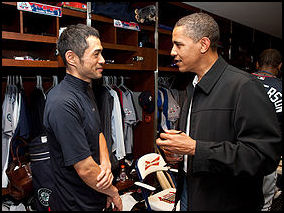
with U.S. President Obama Ichiro was regarded as the best hitter in the Japan League. He was batting champion and golden glove seven times and was voted the most valuable player three times in the Pacific League. During his eight years in the Japan League he had a batting average of .353 and a stolen base average of 28 a year. One time he went 50 games (nearly 40 percent of the season) without striking out. His bat control was such he once hit an errant forkball that bounced off the ground for a single.
Ichiro led the Blue Wave to two pennant titles and one Japan Series championship. In his last year in Japan he earned about $5 million. He rejected an offer of $30 million over five years to stay with the Orix. Ichiro’s single season hit record of 210 still stands. Only one other player has hit more than 200 hits.
Ichiro's Popularity in Japan
After Ichiro's sensational year in 1994, he was overwhelmed with offers for commercial endorsements. Companies liked his youth, freshness and amazing skill and offered him that $1 million for each endorsement. He started his own clothing line.
Around the time of the 1994 Japan Series, the Hyogo Bank offered a special savings account named after Ichiro. The Ichiro Deposit Account gave 3.85 percent interest to match Suzuki's .385 batting average.
Ichiro found the crush of all the attention a burden. As time went on he distanced himself from the media and fans and his popularity waned even though on the field he was consistently successful.
Ichiro was criticized by sme for wearing baggy jeans and a backward baseball cap and listening to American rap stars like Dr. Dre and Snoop Doggy Dog. His batting coach tried to change his unorthodox swing even when he was leading the league in hits.
Ichiro Begins His Career in the United States
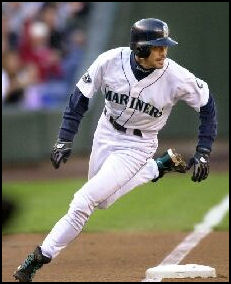
After Ichiro fulfilled his contract obligations in Japan and announced his desire to play on America, the Orix Blue Wave auctioned him off to the highest bidder. The Seattle Mariners won the auction with an offer of $13.1 million, which was paid to Orix.
Ichiro told Kyodo News, “I wanted to play in the majors as early as possible. The posting system was the only way for me. I imagined that I would have a hard time if I had to wait until I became a free agent.” His agent, Tony Attanasio, has said he were prepared to accept anything — from the team to contract terms — to play in the Major Leagues. “Under the posting system, you can't pick your team and you have a limited time for negotiations. It looks like an unfavorable system for players. But back then I hadn't done anything in the United States. I couldn't ask my club (the Orix BlueWave) for permission to go to the Majors unless I was ready to take risks.” [Source: Kyodo, December 21, 2010]
Ichiro signed, by Major League standards, a modest contract of $14.1 million for three years, that also included a lot perks (a translator, a personal trainer, a car, a housing allowance and first class tickets to Japan) and bonuses of hundreds of thousands of dollars for things like plate appearances and winning the MVP and Rookie of the Year awards. He was also allowed to be the only player in the Major Leagues with his first name printed on the back of his jersey.
Ichiro's first trip to Seattle was for an exhibition game when he was still with Orix. He came down with food poisoning and missed two of the four games.
Ichiro began playing in the Major Leagues with the Seattle Mariners in 2001 when he was 27. He was 15 pound heavier than he was two years earlier when Ken Griffey Jr. said, "He's got no booty." In his first game in the Major Leagues he bunted for the first time in seven years and then got a hit, starting the first of several 20-game-plus hitting streaks..
Ichiro was the first Japanese position player in the Major League (the Japanese players that preceded him were pitchers). In May, 2001, Ichiro faced Nomo for the first time since they were in the Japan League together. Nomo hit him with a fastball squarely in the back.
Ichiro's Skill
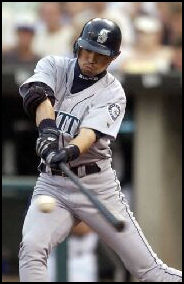
Ichiro bats from the left handed position and catches with his right hand. Sports Illustrated's Jeff Pearlman described him as "a quick-wristed, fast-out-off-the-box slap hitter with excellent control." A front-footed hitter, he shifts his weight forward, hold his hands back with one hand over the knob of the bat, and sometimes kicks up his lead foot, like many Japanese players do, when he hits. This style allowed him to wait longer than other batters so he can he judge the pitches.
Ichiro has an extremely quick bat and has developed a style that allows him to make quick contact and utilize his speed to the maximum level. In some seasons 27 and 28 percent of his have been infield hits.
Ichiro hits very aggressively. He sometimes goes after bad pitches but often manages to get his bat on them and even hit them for hits. He swings from unpredictable directions and is even able to drive inside pitches. He usually hits singles. He has the power to hit home runs — he usually hits more of them than anyone in batting practice — but doesn't hit many in games. He is so fast that even if he doesn’t hit the ball well he can often leg out for an infield hit.
John Moses, the Mariner's first base coach told Sports Illustrated, "It's almost as if he has a tennis racket in his hands. “I'm going to lob this one” — and its blooper over the shortstop's head. “I'm going to ace this one” — and it’s a liner down the rightfield line. he’s toying with guys, and there's nothing they can do about it." No pitcher figured a good way to pitch to him.
In addition to an amazing ability to hit the ball where opposing players aren't, Ichiro has shown amazing speed on the base paths and in the outfield. He routinely beat out ground balls for infield singles, chases down balls hit over a wide area in the outfield and made some spectacular catches against the wall. His throws to the infield are so hard and accurate runners are afraid to advance. Ichiro has won Gold Gloves (2001-2006)
Ichiro once said that when he is in a slump he asks himself for advise. Once when he was asked about what might cause a slump he said, “Maybe its because I ate too much Jell-O or put too much wasabi on the food that I eat. You never know.”
Ichiro's Batting Style
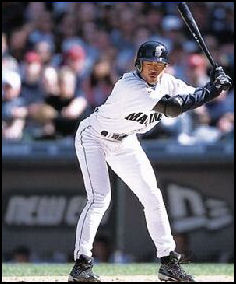
Ichiro uses a number of different techniques when batting: 1) the chop, a downward swing which he is uses to get grounder singles: 2) the flip, which he use to lift the ball over the infield when he’s been jammed; 3) the seeker, in which he speeds up or slows down his swing to hit the ball where the defensive players aren’t; 4) the standard, his usual swing which allows him to foul off pitches he doesn’t like and gives him and inside-out stroke; and 5) the power stroke, which he uses when he knows he can get ahead of a fastball and blast it for a home run.
Although he doesn’t know where the ball will go, he knows the likelihood of it being a hit and says that even his blooper hits are “on purpose.” Lee Jenkins of the New York Times also compared his hitting to tennis: “Slicing balls down the line, volleying them the other way, hitting drop a shot when the defense is back, and hard topspin drives when they are least expected.”
Ichiro once said, “I finished building the basics for hitting a baseball when I was in primary school or middle school student.” That doesn’t mean he hasn’t made adjustments. When he batted in Japan who used wiggle his leg on every pitch. When he came to the Majors he eliminated the leg motion because the pitches were faster. Then he began to swing down on the ball to get more grounders. In many ways Ichiro aims to hit the kind of balls that other hitters avoid hitting and then rely on his speed.
Ichiro had 54 infield hits in 2004 and probably has an unofficial record for getting on base with the worst hits. Ichiro insists he is not particularly fast, saying it is is his technique — which includes his left handed batting position and the fact he stands close to the pitcher in the batting box — and his ability to get out off the batting box quickly that gets him from home plate to first base in 3.7 seconds.
Ichiro's Baseball Routine
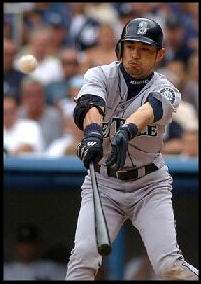
Before every at bat he does the same thing: he squats, he shifts his shoulders and then steps to the plate, takes deep breath, hold the bat out at arms length, tugs on his right sleeve with his left hand and then assumes he batting pose. His bats are specially made in Japan by Mizuno and have a thin barrel and so much black lacquer you can yourself in the reflection.
Describing Ichiro’s routine in the batters box, Pearlman wrote "he crouches into a catcher's tuck, loosening his hamstrings. Then he pops up, plants his left foot, drags it parallel to the plate and plants it again. With his right foot resting outside the box, Ichiro wags his black Mizuno bat back and forth below his belt like a putter. Then he proceeds to whip it around in a counterclockwise loop...When he bring his right foot into the box, Ichiro — knees bent, left elbow cocked high — is ready for the pitch. The routine is repeated before every pitch."
When he isn't hitting or fielding, Ichiro is often seen stretching and doing acupressure on himself. When he was asked why he rubs a inch wooden stick on his feet when he is in the dugout, he said, "It's for pressure points. If your feet are healthy, you’re healthy." When he's at home he watches television with sunglasses on so that his eyes stay sharp and has curry and rice everyday for lunch.
Before every game Ichiro does the same thing: the same stretching exercises and batting warm ups. He sits in a coiling Asian crouch, transfixed in front of television set watching video on the opposing pitcher, looking for weaknesses that he can exploit. His team mates know well enough to leave him alone.
Before the start of the season Ichiro sets goals for himself at different stages of the season sort of like a marathon runner aiming to get certain split times at different stages of the race. He sets goals for every month and certain break-off points in the season, “I set targets that aren’t easy to achieve but for which I don’t overstretch myself,” he told AP.
On getting in shape for a new season Ichiro said, “You have to adapt your body every year. I don’t remember what happened last year...that’s how I operate.”
On he how he spent the 2010-2011 offseason, Ichiro told Kyodo News: “I've been playing golf. I don't get blisters from swinging the bat, but I get blisters all over my hands from golfing. Blisters are signs that you're not a good baseball player or not a good golfer, I think....I haven't grabbed the bat or the ball. I hit my golf ball all over the course, so I have to go look for the ball. It might be harder than my usual training. “Does that mean you think you can finally relax after 10 Major League seasons? “I don't know if I've earned relaxing time or what, but I think my mind has been at ease after I completed 10 years of play in the majors.” [Source: Kyodo, December 21, 2010]
Ichiro's Life in the United States
Ichiro first lived in an no-pets-allowed apartment complex in the Seattle suburb of Bellevue with his wife Yumiko when he arrived in the United States. When asked about the most difficult thing about playing in United States, he said, "I really miss my dog. That’s been the hardest thing so far." Later he moved to a suburban-style house in the Seattle suburb of Medina, where he could keep his dog Ikkyu. Ichiro likes to his afternoons before home games taking walks with Yumiko and Ikkyu. He sometimes whips out a fan with a likeness of his dog on both sides at pres conferences.
When asked about the biggest change. "I'm eating a lot more pizza for lunch than I'm used to," he said. He also said that in general his life was more relaxing than it was in Japan.
Ichiro said that many of the early English words he learned from his teammates were curse words and useless expressions like "chillin' lie Bob Dylan." He liked to say, "”Que pasa”" to his Spanish-speaking team mates and chant Snoop Dogg lyrics on the field. When he was a rookier in the Major Leagues one of his team mates stole his clothes and left him with a Hooter's waitress uniform, which he wore on the team plane.
Ichiromania and the Press
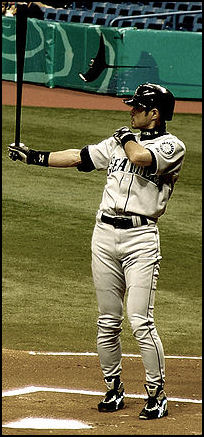
According to one estimate Ichiro helped pump $100 million into the Seattle area economy over five years. The Mariners broke attendance record in 2001, Ichiro’s first year in the Majors, with an average of 3,100 more fans per game more than the previous year; Ichiro merchandise and balls sold briskly at Mariners stores and Ichirolls sold well at stadium sushi stands. Thanks in part to Ichiro the Mariners were one of the few Major League Teams to make a profit in 2001.
In his early years with the Mariners, Ichiro-autographed balls often sold for 10 times more than the balls of his teammates and thousands of Japanese spent thousands of dollars for 3-day, 2-night Ichiro package tours that included a flight from Japan to Seattle, hotel and tickets for a Mariners game. In a survey in Tokyo in 2006, Ichiro was the top choice as the ideal company president.
Mariner promotions have included Ichiro Hydroplane night and ichiroll suchi rolls. When Levis Straus produced a limited edition Ichiro jeans they sold out in six minutes, When free Ichiro bobbing-head dolls were offered as giveaway to the first arrivals at a Mariner's game, people waited in line over night, and the dolls appeared on eBay auction with a price tag in the hundreds of dollars.
The Japanese media was obsessed with covering Ichiro after he arrived in the United States. No less than 23 Japanese writers, 11 photographers and one television crew were given the task of following him full time and reporting on every move he made. When his wife showed up at a game, the press reported she "aroused" him to hit 21 hits in 31 practice pitches.
Ichiro has had a prickly relationship with the press. After photos of him in the shower were sold on the black market and reports surfaced of an offer of $2 million for a nude photograph of Ichiro, Ichiro turned his back to the Japanese press when he talked to them in the locker room. He didn't talk them at all for a week, after a photographers invaded his privacy by getting in his way as he backed his car out of the garage at his apartment.
Ichiro’s success in the United States made him a much bigger celebrity in Japan than he ever was when he played in Japan. He has done commercial endorsements for a stock brokerage company, a housing manufacturer, a drug company and a drink maker. One Japanese fan told the Los Angeles Times she likes Ichiro because has "great self-confidence and is very cool...His play is like a craftsman, very beautiful and solid.”
Pressure on Ichiro and Giving Himself Advise
"I can't speak for Ichiro, but I think any player who doesn't perform up to his own standards feels pressure," Cleveland Indians outfielder Kosuke Fukudome told AP. "It doesn't come from the media, but from within. I never felt that way with the Japanese media, but that is me." [Source: Tim Booth, AP, September 27, 2011]
Tim Booth of AP wrote: “That feeling of pressure is an unyielding force that travels across the Pacific Ocean and has weighed on Suzuki in the past. Before the start of the 2009 season, Suzuki went on the disabled list for the only time in his career while he dealt with exhaustion and stomach ulcers brought on by the hefty weight of leading Japan to the championship of the World Baseball Classic.
The expectation from the people of Japan was incomparable this time. So to become champions in that situation is something that has a lot of meaning for me and what kind of emotions and expectations the Japanese players played upon is something you guys here can't imagine," Suzuki said after winning the WBC title two years ago.
Wedge has noted many times this season the difficulty in giving Suzuki advice. His hitting style is so unique, Wedge said, that while he or hitting coach Chris Chambliss might be able to give a few pointers, Suzuki basically has to coach himself out of slumps. "Ichiro ... is his own best coach. He's always going to know himself better than anybody else," Wedge said. "Yeah, we can help him, Chris can help him, I can help him a little bit if that's what he needs, if that's what he wants, if that's what he's open to. But that's just our opinion. Nobody knows Ichiro like Ichiro."
Ichiro's Early Success
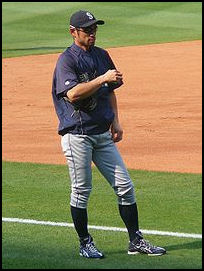
In 2001, Ichiro was named Most Valuable Player in the American League. He received 289 points and 11 first-place votes, barely edging out Jason Giambi of Oakland, who had eight first-place votes and 281 points. Ichiro also was voted Rookie of the Year, making him only the second player to receive the MVP and Rookie of the Year awards in the same year and the first player since Jackie Robinson to lead the league in hitting and stolen bases.
In 2001, Ichiro lead the league in batting average (.350), hits (242, the most since 1930), stolen bases (56), multi hit games (75). He was among the leaders in runs (127) and total basses (316). He set a league record for singles (192) and hit an astounding .445 with runners in scoring position. His only weakness was power. He had only eight home runs and 69 RBIs.
Ichiro also helped lead to lead Seattle to 116 victories, an American League record, and helped get his team off to such a hot start they had an 11 game lead after the first month and a half of the season. He drew 3,373,035 All Star votes, 800,000 more than any other player, with the help of online and paper votes from Japan, and was placed on the cover of the All-Star game program..
In 2002, Ichiro was 2nd in number of hits in the Major League and 4th in the American League in batting average and stolen bases. He hit .321 for the season ad had 208 hits and 31 stolen bases. The Mariners didn’t make the playoffs that year. In 2003, Ichiro hit 212 hits but the year was a bit disappointing by standards. He hit .312. His biggest problem that year was late season hitting. He hit .273 in September 2003 and .248 in September 2002.
In 2003, Ichiro signed a $44 million, four-year deal with the Mariners for the 2004, 2005, 2006 and 2007 seasons. The deal was reached after the Mariners offered $10 million a year while Ichiro’s agent asked for $15 million a year.
Ichiro Sets the Single Season Hit in 2004
In 2004, Ichiro broke the single season Major League hit record, with 262 hits, breaking the the record of 257 hits, set by George Sisler in 1920. After achieving the feat he said in a press conference that he though his record could be broken and then added that he hoped he would be the one to do it.
After breaking the record in Seattle, fireworks went off and there was a five minute delay as Ichiro went over the stands and shook hands with and was congratulated by Sisler’s 81-year-old daughter. Members of Sisler’s family gave him a St. Louis Browns hat signed by Sisler. The baseball Hall of Fame marked the achievement with a special exhibition, as it did when Mark McGuire broke the single season home run record. The exhibit featured the bat and ball used to set the record and the spikes Ichiro wore when he hit it,
Ichiro finished the 2004 season with a .372 batting average, enough to earn him his second American League batting crown. He also led the league in intentional walks (19), the first lead off hitter to achieve this since 1991. He also set a Major League record for multi-hit games (80, breaking the old record of 70 set by Don Mattingly), singles (225), and hits in his first four major league seasons (924) and an American League record for plate appearances (762, the Major League record for that 773). Early in the season when he tried to adapt his batting style by being more patient and trying to hit with more power, his average was only 251
Ichiro’s Achievements as of the Late 2000s
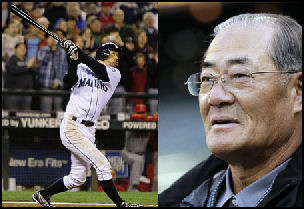
Ichiro and Harimoto Ichiro was named All-Star MVP in 2007 with three hits, including a two-run inside-the-park home run, the first inside-the-park home run, in All-Star game history, leading the American League to a 5-4 victory over the National League. Ichiro said, “I thought it was going to go over the fence. When it didn’t, I was bummed out, The ball’smudged with green and red and signed by Ichiro — was turned over to the Hall of Fame.
As of 2008, Ichiro had been the Major League hits leader five times. In July 2007, he agreed to $90 million, five-year contract extension with the Mariners, three days after he was selected MVP at the All-Star game.
In 2008, Ichiro became the first player to get 200 hits in eight consecutive seasons since Willie Keeler achieved the feat between 1894 to 1901. Ichiro tied the record in his 151st game with three hits in a game against the Kansas City Royals. Ichiro hit his 1,800th Major League hit in September. He was the quickest to reach the milestone of any player in the last 50 years. He reached the mark in 1,277 games. Wade Bogs did it in 1,352 games.
Ichiro played in his 1000th Major League game in May 2008. He got his 200th stolen base in the Major League in June and got his 1,500th Major League hit — on a bunt against the Oakland As — in July. He was the third fastest player to reach that mark. He got 1,414 hits in his 1,000th Major League game, the second fastest in history behind Al Simmons.
Ichiro hit his 3,000th hit in late July 2008 at the age of 34. At that juncture he had 1,722 hits in 1,224 games in eight seasons with the Mariners and 1,278 hits over 951 games in nine season with the Orix Blue wave. Only one other Japanese player reached the 3,000 hit mark — Isao Harimoto, who hit 3,085. Some want to see Ichiro get 3,000 Major League hits or even break Pete Rose’s record of 4,256 Major League record hits.
In 2008, Ichiro tied Wee Willie Keeler’s 1894-1901 major league record of eight straight 200-hit seasons. His success rate for stealing bases is 82 percent. It was 92 percent in 2008 but he hasn’t stolen more than 45 bases since 2001 when he stole 56.
In April 2009, Ichiro broke Japan’s all time hit record with 3,086 hits, breaking a record set by Isao Harimoto. Harimoto was in the stands in Seattle to watch the one-hop smash into right that broke the record and gave Ichiro a thumbs up. Ichiro had 1,278 hits in nine season in Japan and 1,808 hits in nine season in the Major League. He tied Harimoto’s record in dramatic fashion with his first grand slam in six years.
Trouble for Ichiro in 2008
Despite Ichiro’s achievements the Mariners have sucked in recent years. In 2008, they were among the worst teams in baseball and had the distinction of being the first team with a $100 million payroll ($117 million to be exact) to rack up 100 losses. They finished more than 30 games behind the division leader California Angels. Some Mariners players, it seems, put part of the blame Ichiro, who was accused of not being a team player.
In 2008, Ichiro looked bored and unhappy and went through a nasty slump at a time the Mariners look particularly bad. During the Mariner’s annual education day he was hissed by schoolchildren when he didn’t make a speech, using a coach to speak for him, and was only team member who showed up without a uniform.
There were reports that jealous team mate planned to get physical with him. On Ichiro one “clubhouse insider” told the Seattle Times, “I just can’t believe the number of guys that really dislike him. It got to a point early on when I thought they were going to get together and go after him.” At one point the Mariner’s manger had to intervene when a player was overheard saying he wanted to “knock him out.” Several Mariner’s players and coaches said they remember no such incidents and called Ichiro the hardest working member of the Mariners and blamed the rumors on the Mariners horrible, losing record. There have been rumor s for a while that some of his team mates regard him as selfish, more interested in his hit totals and personal records than the success of his team.
Even so, in a July 2008 game between the Mariners and the Oakland A’s Ichiro became the object of a bench-clearing brawl when the Mariners stuck up in defense. Trying to get a ball near the Seattle dugout an Oakland pitcher shoved Ichiro out of the way after he scored a run. A Mariner’s player took exception to this and went after the pitcher. Afterwards the benches cleared.
In 2008 Ichiro was sporting faded jeans, outrageous T-shirts, gold or silver sneakers. He still had a full-time translator employed by the Mariners drew crowds and a posse of two dozen Japanese journalists to his preseason games in Arizona.
Ichiro in 2009
Ichiro began the 2009 season on the disabled list, sidelined by a bleeding ulcer. It was the first time he had been placed on the disabled list in his Major league career. Up to that time he missed only 16 games in eight years and three in the previous five season. Severe fatigue connected with the World Baseball Classic was partly blamed the ulcer. There some resentment in the Mariner clubhouse about Ichiro getting preferential treatment in being allowed to play in the World Baseball and quotes in the newspaper that alluded to fact that Ichiro still “wasn’t really a team guy.”
In 2009, Ichiro shared the spotlight with Ken Griffey Jr., who returned to the Mariners, the team he played for when he was in his prime. Ichiro seemed much happier, relaxed and at ease. Many credit Griffey, who Ichiro idolized as a kid, and his joking, outgoing personality. At education day in 2009, Ichiro was laughing and goofing around — albeit still not wearing a Mariner uniform, instead wearing black skateboard sneakers and designer jeans rolled up at the ankles. [Source: AP]
Ichiro still cherishes the No. 24 Griffey Mariner’s jersey he has had since the 1980s, “Griffey has always been my hero,” he told AP through an interpreter. “To be able to wear a uniform with a hero of mine is special for me.” As for his improved attitude he said, “Also a big factor this year is, when I got sick in spring training [with the ulcer], it made me appreciate baseball that much more and be thankful for it and what it means to get to wear a uniform and play. Those are the things that made me have more fun this year.” On playing with Ken Griffey Jr., Ichiro told Kyodo News,”I never thought I would have a chance to play alongside Junior on the same team. It was so special to spend time with him.”
In May and June 2009, Ichiro pulled off a 27 game hitting streak, a Mariner record. It was Ichiro’s seventh hitting streak in the Majors of at least 20 games, tying him with George Sisler for forth. Ty Cobb, Pete Rose and Willlie Keeler each had eight 20-plus game streaks.
The Mariners still weren’t very good. They started off the season hot but later fell below 500 with dodgy starting pitching, error-prone defense and weak hitting. Although Griffey helped bring some laughs to the clubhouse he didn’t play so well. He started out in left field but then became designated hitter with an avenge much of the season barely above .200.
See Word Baseball Classic in 2009
Most 200 Hit Seasons Record for Ichiro
In mid September 2009 Ichiro got his 200th hit of the season — an infield single — for the ninth straight season, breaking a Major League record that had stood for 108 years. To celebrate team mate Ken Griffey swung Ichiro over his shoulder and carried him to the shower where he was bathed in beer by his team mates. The previous record of eight straight seasons with 200 hits was set by Willie Keller from 1894 to 1901. In 1994, Ichiro became the first player in Japanese baseball to reach the 200 hit mark with 210 hits, which he did in a 130 game season in Japan compared to 162 in the Majors.
A week or so earlier Ichiro got his 2,000 Major League hit. He is the 259th Major Leaguer to reach that milestone. Only one Hall of Famer did it in fewer games. He achieved the mark even though he missed 16 games due to injury — the same total he missed in the previous eight season, He missed eight games at the beginning of the season because of a stomach ulcer and missed eight more games in August due to tightness in his calf.
Ichiro has won his ninth straight gold glove in 2009, one short of the National League record set by Ken Griffey and Hall of Famer Al Kaline.
In 2009, Ichiro was criticized in the Seattle media as being selfish for celebrating tying the 200-hit record them celebrating it in season in which the Mariners lost 101 games.
Ichiro in 2010
In 2010, again the Mariners sucked. There were high hopes at the beginning of the season and the first few weeks of the season they stayed around .500 but by the All-Star break they were in last place, 18 games below .500 and 15 games behind the division-leading Texas Ranges, with team runs (3.39) and team batting average (.238) the second lowest in team history. Ichiro told a group of reporters ahead of the All-Star Game, “To be honest with you, I can’t even explain in words. It’s very, very tough, hard and depressing.” At the end of the season he told Kyodo News, “After all this time, I wonder why we still lose this many games.”
Ichiro ended the 2010 season with a Major-League-leading 214 hits, he batted .315 in 162 games and had 74 runs, six home runs and 43 RBIs. The Mariners ended the season in last place, 29 game out of first place with the second worst record in the Major Leagues.
Ichiro made $18 million in 2010. On the 2010 season , he told Kyodo News: “I wasn't in good form since April, so I knew I was going into a slump sooner or later. But the down time came later than I thought. I don't know why I managed to get hits in the first few months of the season. Every year, April is the month to get used to live pitching. I often have a good year after struggling in April. If I do well in April, it gets hard for me to decide whether I need to make adjustments to my mechanics. Things get even harder if I find problems late in the season. Hitting is always an adjustment. The word “difficult” is not enough to explain what hitting is. Hitting is never easy.”
More Records for Ichiro in 2010
In 2010, Ichiro became the first Major League player to hit 200 hits or more in 10 straight seasons. He got his 200th hit, a single to center off the Toronto Blue Jays. The only other players to have ten 200 seasons (not consecutive ones) are Pete Rose and Ty Cobb. Ichiro said afterwards, “I like to think I know how difficult it is more than anyone...It did mean a lot to me.” This time there were no hard feelings among his team mates like there was in 2008. “I saw my team mates congratulate me, and it was then that I realized I could enjoy this. I’m still traumatized by two years ago, so I’m a bit relieved.”
Ichiro’s friend and former team mate Kenji Jojima said, “The 200 hits are the fruit of all the work he’s put into his technique over the years. He plays throughout the year without getting hurt, and the way he prepares himself is incredible...I hope he can keep breaking records...It is just a phenomenal record.”
Ichiro reached the 3,500 hit mark in September 2010, a week or so before he reached the 200 hit mark for the 10th consecutive season, with 2,222 hits in the Majors and 1, 288 in the Japan League. The mark didn’t mean that much to Ichiro who said afterward, “I wasn’t particularly aware of it, I don’t consider this a real milestone.”
Ichiro Struggles in 2011
Ichiro ended the 2011season with 184 hits and a .272 batting average -- both career lows. His on-base percentage was .310 — 40 points below his worst OBP entering this season. He had his major league record streak of consecutive 200-hit seasons snapped at 10. He remains tied with Pete Rose for most 200-hit seasons in a career. AP reported: "He also for the first time in the Majors missed out on a Gold Glove, failed to make the All-Star team and failed to hit .300 for the first time since joining the Mariners in 2001. "I go through the same process in the offseason. I feel fresh, ready to go for the challenge,'' Suzuki said. "If those numbers were in '01, a lot of people would have said, 'Hey, this guy can play.' Expectations are very high.'' The Mariners were a 67-95 and finished in last-place in the American League West division. [Source: AP February 20, 2012]
Kyodo reported: “Many people argue that Ichiro Suzuki had his record streak of 200-hit seasons snapped at 10 because he is getting old. The 38-year-old Seattle Mariners star, however, indicated in a recent interview that he hopes to hear a better explanation. "I admit I sometimes feel I'm getting older when old-school songs sound better than new ones, or I get more sensitive to what TV personalities say, or my skin gets dry," Suzuki said. "But it's boring if you just conclude everything gets old. I don't enjoy talking with those who just think that way. In many cases, those people can't even take care of themselves." [Source: Kyodo, January 4, 2012]
Suzuki got off to a hot start in 2011, leading the American League with 39 hits in April — tied for his most in the month in his 11-year major league career. But April (.328) turned out to be the only month he hit .300 or better in the season. "Needless to say, if you're professional, you have to come up with results," Suzuki said. "I didn't feel good at the plate, but I continued to get hits in April. I think it was the most troubling start I could think of. "Every year, it's hard to judge in April if what you tried in spring training was right. As for this past season, I thought I was right because I was getting hits, but I was wrong. It takes time until you know what went wrong." Suzuki continued, "In April 2011, the gap between the results and my feel was bigger than ever. It's almost impossible for me to tell myself 'This is wrong' when things are going well. I felt desperate during the season. That doesn't happen to me very often. To me, mental stress is a lot worse than physical stress. If I can get two or three hits every day, I'll never feel tired. One hit relieves my stress, more than one hour of massage."
Opposing teams have been trying various ways to stop Suzuki since he jump-started his major league career by winning both the AL Rookie of the Year and MVP awards in 2001. In 2010, about 27 percent of his hits were infield hits. The percentage dropped to about 21 percent in 2011. The Oakland Athletics have moved their second baseman and shortstop an additional two steps forward to prevent the speedy Suzuki from reaching on infield singles, according to infield coach Mike Gallego.
"I feel good. I don't know why," Suzuki said when he was asked to comment at the end of his 11th season in the majors. After the last game of the season he said, "I struggled with myself for about two months at one point in the season. And then I had to admit that my 200-hit streak was going to end this year. That's why I don't feel bad at all now. I'm kind of relieved I won't be pressed by the need to continue something."
Early in the 2011 season Ichiro became the Mariner’s career hits leader with his 2,248th hit, beating the record set by friend Edgar Martinez. In June 2011, Ichiro stole his 600th career stolen base in Japan and the Major Leagues. He stole 199 bases with the Orix Buffalos in Japan and the rest with Mariners. As of the All-Star break in July he was batting .274 and failed to make the Major League All-Star game. It was the first time since he became a starter with the Orix Blue Wave in 1994 that he was omitted from a All-Star roster. In 2011, he finished seventh in the fan balloting but was not added to the All-Star team by either the players ballot or manager’s selection. Ichiro’s absence also marked the first time since 2000 a Japanese player was not on the Major League All-Star roster.
Tim Booth of AP wrote near the end of the season, “His outfield play has been spotty at times and Suzuki has shown that maybe the pressure of trying to live up to what he's done over the first 10 years in the majors has gotten to him. He wasn't an All-Star for the first time and probably will miss out on an 11th straight Gold Glove as well. Perhaps no single moment was more telling than a mid-August game against Toronto when, with the Mariners down by three runs with two runners on and two outs, Suzuki attempted to bunt for a base hit rather than swinging away and trying to drive in runs.In a rare instance at Safeco Field, Suzuki was booed by his home fans. He was admonished by Wedge and seemed humbled by the situation. But that one at bat spoke to the bigger picture of the pressure Suzuki still believes he feels being the biggest Japanese star playing in America.
Ichiro in 2012 with the Mariners
The 2012 season was the final year of Ichiro’s contract with the Seattle Mariners. The 38-year-old outfielder began his 12th spring training with the Mariners in February without saying if, or when, he would retire. "When I first came in 2001, I never thought that I would be here in 2012,'' he said through translator Antony Suzuki. "You can wish you'd be there, but you never know. So it's the little things that count and it's the little things that you build off, to where you've come this far.'' [Source: AP February 20, 2012]
Ichiro was often dropped from his customary leadoff spot in the batting order. He had two Japanese teammates, infielder Munenori Kawasaki and pitcher Hisashi Iwakuma, and said he heard he was Kawasaki's baseball hero growing up, that Kawasaki would imitate him and wanted to play for the Mariners because of Suzuki.
In 2012, with the Mariners, Ichiro hit just .261 — 62 points below his career average. In June 2012, Ichiro got his 2,500th Major League hit, after going 4-5, in a Mariners win over the Diamondbacks. At that point f his Japan League hits were included he had 3,781 hits. Only Pete Rose and Ty Cobb have more,
Ichiro Versus Pete Rose
Who was a better hitter Pete Rose or Ichiro? Should Ichiro’s Japanese league bats be counted towards his career total? If not, how should the two hitters be compared? These are questions that provide material for television sports pundits and newspaper columnists. ESPN’s Rob Neyer is among those who argue that Ichiro’s hits in Japan should not be counted but the fact that Ichiro was prevent from playing the Major Leagues until he was 27 should factored into the equation.
On sports columnist described Rose, nicknamed “Charlie Hustle” in is day, as a winner and Ichiro as selfish pursuant of statistics, “Those of us who grew up when Rose was in his heyday...bristle when people try to compared Ichiro to him...Rose was consumed with winning” while “Ichiro plays for stats.”
Pete Rose has the all-time Major League hit record with 4,256. Ty Cobb is second with 4,191. Rose had more walks and doubles than Ichiro but Ichiro was a better base stealer and defensive player. Perhaps most important for Rose is that he distinguished himself as a star player in post-season play and the World Series. Rose has said that Ichiro was lucky to get so many hits in the Major Leagues and dismissed Japanese baseball as equivalent to American Triple-A level at best.
Japanese baseball expert Jim Allen wrote in the Daily Yomiuri: “Any comparison of Rose and Ichiro is complicated by the fact that their opportunities were not equal. Cincinnati was able to give Rose a Major League job when the club felt he was ready, and he began his Major League career, six days before his Major League birthday...Ichiro was bound to the Orix Blue Wave until they made him available for Major League clubs...in November 2000, a few weeks before he turned 28.”
“While Ichiro was racking up 1,278 PL hits before his 27th birthday, Rose had 903 NL hits in 763 games before turning 27...Between the ages of 27 and 34, Rose had 1,886 hits, Ichiro, with a higher average and 250 more at-bats because he walks less, had 2,030 hits...After turning 34, Rose amassed 1,467 hits in 11 seasons. His offensive numbers didn’t begun to decline until he turned 41, the last year of his career in which he played all 162 of his team’s games...Rose had 159 hits in his final two seasons, but played regularly because he failed in his job as manager and wrote himself into the lineup every day when better hitters were available.”
“Ichiro’s hit total in the majors is far ahead of what Rose accomplished during the same seasons. Can Ichiro match or exceed Rose’s total of 3,333 after turning 27? If he does the two deserve equal billing in any discussion about who was better at putting hits in the board.” On Ichiro, Rose said, “He’s the type of player that belongs on a good team because you can’t really see his effect in the game.”
Image Sources: Wikipedia, Picsearch file sharing
Text Sources: New York Times, Washington Post, Los Angeles Times, Daily Yomiuri, Times of London, Japan National Tourist Organization (JNTO), National Geographic, The New Yorker, Time, Newsweek, Reuters, AP, Lonely Planet Guides, Compton’s Encyclopedia and various books and other publications.
Last updated January 2013
